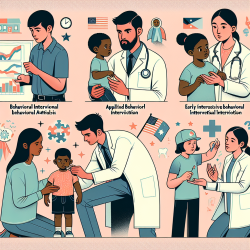Unlocking the Power of Civil Society: Lessons for Speech Language Pathologists
In the realm of public health, the involvement of civil society, particularly nongovernmental organizations (NGOs), has proven to be a cornerstone of effective intervention strategies. The research article "Civil Society Involvement in National HIV/AIDS Programs" offers a compelling exploration of how NGOs have been pivotal in the global response to HIV/AIDS. For practitioners in speech-language pathology, the insights from this research can be transformative, offering lessons on collaboration, advocacy, and the integration of community resources to enhance therapeutic outcomes.
Key Insights from the Research
The study highlights several critical roles played by NGOs in the HIV/AIDS response, including:
- Advocacy and Policy Influence: NGOs have been instrumental in advocating for policy changes that ensure access to essential medicines and treatment for marginalized groups.
- Community Outreach: NGOs excel in reaching hidden and underrepresented groups, providing risk-reduction education and facilitating access to care and support.
- Support for Treatment Compliance: By supporting treatment adherence, NGOs help ensure that individuals receive continuous care, improving health outcomes.
These roles underscore the importance of community engagement and the power of collective action in achieving health goals. For speech-language pathologists, this translates into the potential for improved patient outcomes through community partnerships and advocacy.
Implementing These Insights in Speech-Language Pathology
How can speech-language pathologists leverage these insights to enhance their practice? Here are some actionable strategies:
- Build Partnerships: Collaborate with local NGOs and community organizations to extend the reach of your services. These partnerships can facilitate access to resources and support for families in need.
- Advocate for Policy Change: Engage in advocacy efforts to influence policies that impact access to speech-language services, particularly for underserved populations.
- Enhance Community Outreach: Develop outreach programs that educate communities about speech-language disorders and the importance of early intervention.
By adopting these strategies, speech-language pathologists can play a pivotal role in creating inclusive and supportive environments for children and families.
Encouraging Further Research
The research on civil society involvement in HIV/AIDS programs provides a robust framework for understanding the impact of community engagement. For practitioners interested in expanding their knowledge and skills, further research in this area is encouraged. Exploring the intersection of community resources and therapeutic interventions can yield innovative approaches to speech-language pathology.
To read the original research paper, please follow this link: Civil Society Involvement in National HIV/AIDS Programs.










